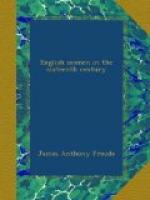Nothing could be better if the more vulgar necessities had been looked to equally well. Unluckily, Medina Sidonia had taken the inspection of these on himself, and Medina Sidonia was unable to correct the information which any rascal chose to give him.
At length, at the end of April, he reported himself satisfied. The banner was blessed in the cathedral, men and stores all on board, and the Invincible Armada prepared to go upon its way. No wonder Philip was confident. A hundred and thirty galleons, from 1,300 to 700 tons, 30,000 fighting men, besides slaves and servants, made up a force which the world might well think invincible. The guns were the weakest part. There were twice as many as the English; but they were for the most part nine and six pounders, and with but fifty rounds to each. The Spaniards had done their sea fighting hitherto at close range, grappling and trusting to musketry. They were to receive a lesson about this before the summer was over. But Philip himself meanwhile expected evidently that he would meet with no opposition. Of priests he had provided 180; of surgeons and surgeons’ assistants eighty-five only for the whole fleet.
In the middle of May he sent down his last orders. The Duke was not to seek a battle. If he fell in with Drake he was to take no notice of him, but thank God, as Dogberry said to the watchman, that he was rid of a knave. He was to go straight to the North Foreland, there anchor and communicate with Parma. The experienced admirals who had learnt their trade under Santa Cruz—Martinez de Recalde, Pedro de Valdez, Miguel de Oquendo—strongly urged the securing Plymouth or the Isle of Wight on their way up Channel. This had evidently been Santa Cruz’s own design, and the only rational one to have followed. Philip did not see it. He did not believe it would prove necessary; but as to this and as to fighting he left them, as he knew he must do, a certain discretion.
The Duke then, flying the sacred banner on the San Martin, dropped down the Tagus on the 14th of May, followed by the whole fleet. The San Martin had been double-timbered with oak, to keep the shot out. He liked his business no better. In vain he repeated to himself that it was God’s cause. God would see they came to no harm. He was no sooner in the open sea than he found no cause, however holy, saved men from the consequences of their own blunders. They were late out, and met the north trade wind, as Santa Cruz had foretold.
They drifted to leeward day by day till they had dropped down to Cape St. Vincent. Infinite pains had been taken with the spiritual state of everyone on board. The carelessness or roguery of contractors and purveyors had not been thought of. The water had been taken in three months before. It was found foul and stinking. The salt beef, the salt pork, and fish were putrid, the bread full of maggots and cockroaches. Cask was opened after cask.




